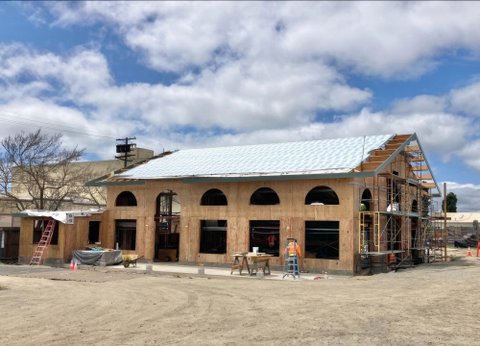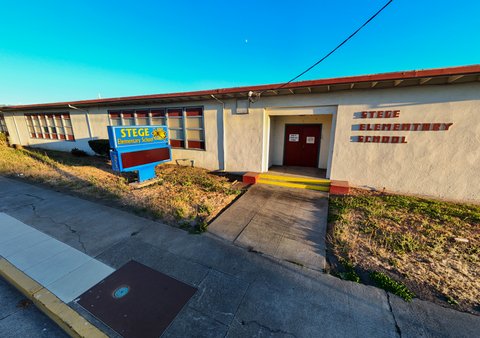
08 May Little Richmond Nonprofit Wins Big State Funding to Build Community Emergency Center

Pogo Park’s Harbour Hall, a 3,500 square foot community center under construction at Harbour-8 Park in Richmond. The Community Resilience Center grant pays for the necessary upgrades to make Harbour Hall a place for residents to access water, food and back-up power during emergencies. (Pogo Park via Bay City News)
By Aly Brown
Bay City News
After winning a highly competitive state grant, one small nonprofit will build a new recreation center this year that will double as an emergency shelter during climate and other emergencies.
With a $10 million Community Resilience Center grant, Pogo Park — a Richmond nonprofit with a mission to transform lives by transforming public spaces — will construct Contra Costa County’s first CRC at Harbour-8 Park. Harbour-8 is a two-block park on the Richmond Greenway, which is a 2.5-mile trail landscaped with community gardens and art.
>>>Read: Filmmaker’s Career Began on the Richmond ‘Greenway’
“This CRC grant is a game-changer for Richmond,” said Toody Maher, Pogo Park executive director. “It will create a world-class CRC in a neighborhood with the highest need for emergency services and preparedness.”
Funds for the CRC grant program came from the California Strategic Growth Council, a cabinet-level committee established in 2008 via Senate Bill 732. It’s tasked with achieving sustainability, equity, economic prosperity and quality of life for Californians.
In late April, SGC approved $93.6 million to help build CRCs in neighborhoods most impacted by extreme heat and climate issues.
In Richmond, construction is already underway for the Harbour Hall, and it’s expected to be completed by the end of the year, said Maher. She explained that plans for building the hall had already taken shape thanks to a previous California State Parks grant, but winning the CRC funding gave Pogo Park the ability to further upgrade the facility to make it equipped to serve the community during emergencies.
She recalled the Chevron Richmond Refinery fire in 2015 and how 300 people flooded Pogo Park’s Elm Playlot because everyone knew it was being run by people from the community.
“When we were building the community center, our Pogo Park team of residents said, ‘Look what happened with Chevron in 2015. You know they’re going to be coming to this park. So we should really be ready for emergencies — to have the backup power, the best food,'” Maher explained. “So sure enough, this CRC grant opportunity came up, and the Pogo team of residents were really saying, ‘Look, here’s our chance to turn the hall — this new hall that is being built now — to make the upgrades to make it into a CRC.'”
The $10 million project will include $6 million for physical infrastructure, $3 million for programs and events, and $1 million for evaluation and general program support.
Part of the design enhancements include a commercial-grade kitchen, which can be used to prepare food during emergencies, but also serve the community year-round to support cooking classes, or to be used by vendors who wish to sell food from carts but need to be connected to a commercial kitchen, Maher explained.
Enhancements also include retrofitting the 3,500-square-foot community center under construction now to provide back-up power, water, communication and support during emergencies; a green landscaping to filter stormwater, and an information station in the middle of the park.
CRCs provide shelter and resources during climate and other emergencies, as well as year-round services and programming that strengthen community connections and build resilience.
As part of Gov. Gavin Newsom’s $48 billion California Climate Commitment, the CRC grant aims to build climate resilience in California’s most underserved communities.
The highly competitive statewide grant garnered nearly 200 applicants, and Pogo Park was only one of nine CRC implementation projects recommended for funding. Maher expressed excitement that her small nonprofit was able to win a state grant going up against entire municipalities and other large agencies.
To make Harbour Hall a reality, Pogo Park worked alongside partners, including the city of Richmond, the Iron Triangle Neighborhood Council and Richmond CERT.
“Pogo Park will be a critical partner in facilitating the expansion and implementation of emergency preparedness programs and initiatives in the Iron Triangle community,” said Richard Diaz, Richmond Emergency Services manager.
Richmond Council member Soheila Bana said the impact from this investment in public safety will raise awareness throughout the community and the larger county, while providing “a model to local governments from the entire county and beyond as a practical solution.”
James Anderson, local resident and Pogo Park staff member, said watching the community change and develop has been amazing.
“Having a place where people in the Iron Triangle can go during an emergency makes me and my family feel safe,” Anderson said. “Being part of Pogo Park’s efforts to improve Richmond is truly a blessing.”
Copyright © 2024 Bay City News, Inc. All rights reserved. Republication, rebroadcast or redistribution without the express written consent of Bay City News, Inc. is prohibited. Bay City News is a 24/7 news service covering the greater Bay Area.






No Comments